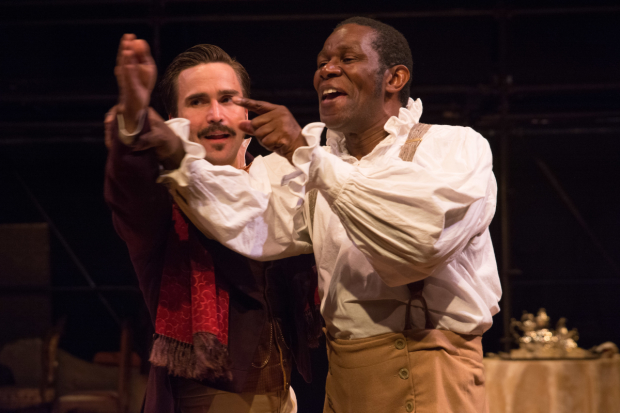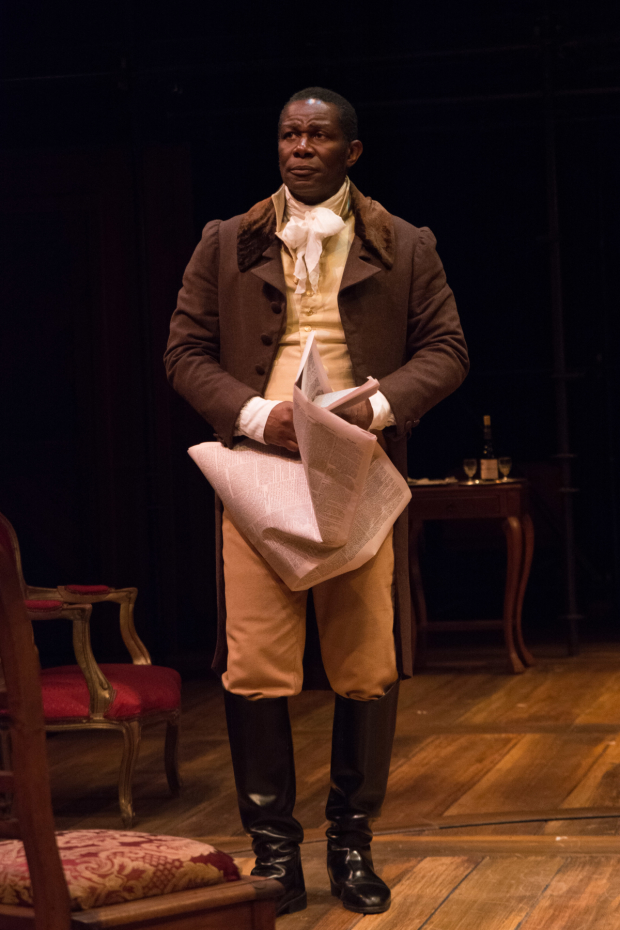Red Velvet

(© Enrico Spada)
Relatively few people know the name Ira Aldridge. But they should. In 1833, he became the first African-American actor to play the role of Othello on a major London stage (until then, the role was traditionally performed by a white man in blackface). The American-cast premiere of Lolita Chakrabarti's Red Velvet at Shakespeare & Company's Tina Packer Playhouse, explores his early career and the immense difficulties he faced onstage and off. John Douglas Thompson plays the boundary-breaking actor with deep sensitivity and fiery passion in a work that challenges modern audiences to question their own prejudices about race and to reexamine the essentially political role of theater.

(© Enrico Spada)
The play begins in 1867 Poland with an aged Aldridge (Thompson) preparing for a performance of King Lear in a dressing room (which designer Matthew Miller hauntingly lights like an old photograph). He is interrupted by an eager young reporter (Christianna Nelson), who wants to know why he has not returned to perform at Theatre Royal in Covent Garden, London. The action then flashes back to the Covent Garden theater in 1833. The great British actor Edmund Kean has taken ill and can't play Othello. Manager Pierre Laporte (Joe Tapper) calls on an old friend who has been getting good notices in regional venues. When the cast members meet Kean's replacement, a black actor, all hell breaks loose and the troupe divides itself into factions for and against his presence onstage with them. But the show must go on, and it does. Aldridge's aggressive, nontraditional acting style, however, offends the critics — and the theater's board of directors. When Laporte confronts him with the news, the two engage in a heated clash that ultimately forces the actor to leave London behind.
With some exceptionally astute writing, Chakrabarti plunges her characters into engaging verbal dialogues about racism, sexism, and classism that sound eerily similar to any of the political debates that might be heard on cable news — except that everyone is dressed in pre-Victorian garb (gorgeous, spot-on costumes by Moria Sine Clinton). Director Daniela Varon elicits marvelous performances from her actors. John McDermott's simple set of chairs, table, and tea set effectively transforms the Tina Packer Playhouse into the greenroom of the Theatre Royal. With proud-feminist dignity, Kelley Curran plays the actress Ellen Tree, who is all for Aldridge playing Othello to her Desdemona, unlike her privileged fiancé, Charles Kean, acted with stuffy indignation by Ben Chase.
Kean is complemented by fellow actor and defender of the status quo Bernard Warde (a hilarious Malcolm Ingram). Aaron Bartz plays the politically minded, progressive actor Henry Forrester. Ravin Patterson rounds out the cast in the understated yet memorable role of Connie, a Jamaican servant at the theater. "I fin' mo' often than not," Connie says presciently to Aldridge, "people mostly have two face don't you think? An' when you show 'em a weak spot them rub it." Sadly, that often proved true for the great actor.
The highlight of the production is Thompson, who shows his astonishing artistry in constructing a character who is immensely strong and determined, yet all too vulnerable to those weak spots. His older Aldridge, seen at the play's beginning and end, is full of pride and bitterness. The hopeful, exuberant young actor that he shows us in the 1833 scenes, on the other hand, seems almost a different man. Thompson gives us a sophisticated, ambitious, eminently polite young actor who's nevertheless unafraid to challenge the rigid norms of upper-class British society in an effort to create something new onstage. But in the second-act confrontation between Aldridge and Laporte (Tapper's performance here is breathtaking), Thompson lets loose a tidal wave of fierce emotion that leaves the audience shaking. This is the passionate, frustrated man who we suspected glowed hot beneath the surface.
Chakrabarti does more than imagine the struggles and conflicts that Ira Aldridge may have confronted. She demonstrates how important theater is for addressing the issues and debates of the times. For its examination of a major artist in stage history, Red Velvet is significant. With Thompson and this stellar cast, it's an essential piece of theater.











